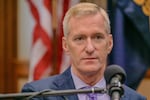On Wednesday, Portland Mayor Ted Wheeler announced that he will not be running for a third term. Wheeler cited many factors for the decision, including a need to focus on reshaping Portland’s government and wanting to spend time with his daughter before she graduates from high school.
Wheeler said he can’t do everything while also campaigning, which he called a full-time job. For his final 15 months as mayor, Wheeler said he will focus on a number of issues including homelessness, public safety and downtown economic recovery.

Portland Mayor Ted Wheeler, during an interview with OPB’s Dave Miller at Portland City Hall, Sept. 14, 2023. Wheeler announced on Wednesday that his will not be seeking a third term as mayor.
Sheraz Sadiq / OPB
Wheeler joined OPB’s “Think Out Loud” to discuss this decision and the future of the city. Here are excerpts from the conversation:
Challenges addressing homelessness
“The city has nothing to do with homelessness or human services, traditionally and historically. We don’t have the people, we don’t have the expertise, we don’t get the federal funding or state funding for those purposes. Under my administration, we have moved significantly towards connecting people on the street with services they need to get off and stay off the streets, including looking at larger-scale camps, setting up our own contractual relationships with service providers who do provide those services. That’s one of the challenges but I think that’s a necessary step to address homelessness.”
“Every dollar we spend on homelessness comes out of what’s called the general fund account. That account is what funds first responders and public safety. Our police, our fire, our 911 emergency call center, our emergency management response function. Ultimately, the city, the county, Metro, the state, we need to get on the same page. We need to have a collaborative plan.”
Why he asked Gov. Tina Kotek to send state troopers
Related: Mayor Ted Wheeler wants nearly 100 state troopers to help police Portland
“What we need at the local level, with the call of 96 state troopers, is to help us with the downtown area in particular where we have this problem with fentanyl and p2p meth, and also to help us with traffic enforcement. We picked that 96 number because that is our proportional share based on population here in the city of Portland. We pay for the state police, and I’m keenly aware other communities rely on state police, but we pay for that service as well. And we need them right now, even as a temporary stopgap measure, until we can have enough police officers and enough patrols on the street to make a difference. I would go further and say it is of critical importance for the state at large that Portland be a safe place to live.”
”Portland needs to be fixed. Portland needs to get its act together, the reason is we’re the economic engine of the state. If Portland fails, there really isn’t a business case for the rest of the state.”
What the future of downtown Portland could look like
“We need to diversify our economy. Include things, like the sports and entertainment district, that have become a bigger part of our economic competitiveness. The green economy, green infrastructure, green manufacturing, energy solutions and the like that should be a bigger component of our economy than it currently is. And then there’s just the last piece that’s not like the others. People do better when they collaborate. I brought our employees back with the full support of our City Council. They’re required to be back three days a week. There was a lot of pushback and challenges to that, but now that we’ve done it and have been doing it for a number of months, the feedback I’m getting is positive. People were feeling isolated.”
“The structure of the workday has changed permanently and it will probably continue to evolve in other interesting ways. But I think it’s important for people who can bring their employees back, as much as possible, to be able to help make our city work. If our city is activated, it’ll address some of the other issues people see with livability.”
On transitioning to a new form of city government
“It is yet to be determined how the structure of government will function day-to-day. That really will depend on the strength of personalities and the willingness to build coalitions of support for the mayor’s initiatives. Remember the mayor under the new form of government doesn’t preside under the council as I do today.”
Related: Portland’s new government will include more administrators, better accountability
“I think it’s appropriate as we shift to a new form of government, to have new leadership come in and take it where it can go. I think Portland’s best days are ahead of us. I see new energy, new ideas coming to the table, and some really great leveraging opportunities with this new form of government.”
“We can’t wait until Jan. 1, 2025, to move to the new form of government, we have to do it sooner rather than later. That’s not only doing things like renovating offices here at City Hall, which can cause great inconvenience to those currently located here. We obviously have to create the ranked-choice voting system, and that is underway. But, importantly, we have to appoint an interim city manager prior to 2025 and we have to move all bureaus under the interim city manager.”
You can listen to the full conversation here:
